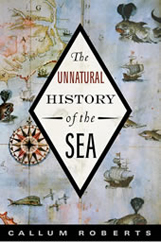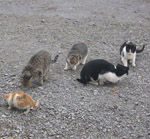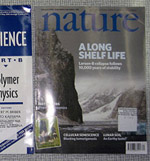The unnatural history of the sea: book review
 by Callum Roberts
by Callum Roberts
Island Press, 2007, 495 pp.
Reviewed by Rob Goldstein
Looking at the history of fishing to understand the current state of the sea...
Callum Roberts' book, The Unnatural History of the Sea, proceeds with a logical premise - we must look at the history of human exploitation of the ocean, particularly industrial fishing, if we want to understand the extent to which we have altered marine ecology. From this simple idea, Roberts constructs an epic history of fisheries and their tragic transformation of the oceans.
The narrative begins chronologically with the origins of intensive fishing in the middle ages and continues all the way to the modern era of industrial fisheries. Certain chapters focus on specific industries - e.g. whaling, seals, cod, etc - while other chapters focus on the exploitation of particular ecosystems - e.g. coral reefs, estuaries, etc. Roberts, professor of marine conservation at University of York, conducted extensive historical research and incorporates hundreds of accounts from fisherman, merchants, pirates, naturalists and others. These accounts are particularly important in reconstructing what the condition of the ocean may have been like prior to industrial fishing given that comprehensive fisheries data collection is only decades old. In the absence of scientific records, Roberts uses these accounts as qualitative data points to support his thesis - namely that intensive fishing of the last 1000 years has led to a radical decrease in population size and range of many species critical to ecosystem health and the oceans of today are a thoroughly degraded remnant of what once existed. For example, he writes about the Chesapeake Bay:
Significantly, Smith and other seventeenth-century writers name animals that are today extremely rare in the bay. Pilot or killer whales and other even larger whales where then regular visitors to the Chesapeake. A 54 foot whale was cornered and killed in the James River in 1746, for example…Porpoises too were widespread…Diamondback terrapins also bred prolifically in the Chesapeake and other bays and rivers and were esteemed as food.
While some scientists may question the use of historical accounts for establishing past ecological conditions, this qualitative data is important for avoiding the curse of 'shifting baselines.' Shifting baselines occur when ecological degradation is large enough over a long enough period of time that scientists, policy makers, and the general public wrongly assume that a more recent degraded condition is the actual natural state. Roberts argues that this is the case with the sea given that the beginning of systematic collection of fisheries data is recent while degradation of the ocean stretches back much farther. This can have negative implications for the work of managers and policy makers who set fishing quotas or conservation targets based on assumptions of historical abundance.
 American colonists posing with sturgeon, 18 feet long and weighing up to 1800 poundsWhile the devestation to the ocean that Robert's decribes is tragic, the book itself is much more engaging than depressing. As destructive as fishing has been, I couldn't help but find fascinating the colorful stories of the fisherman, whalers, explorers, pirates, and others sailing to farthest reaches of the globe with crazy adventures witnessing and describing a fertile ocean that is unlike anything we know today. Roberts really brings this history to life. He has a gift for writing and an obvious affection for the material, but he also lets these interesting historical accounts speak for themselves.
American colonists posing with sturgeon, 18 feet long and weighing up to 1800 poundsWhile the devestation to the ocean that Robert's decribes is tragic, the book itself is much more engaging than depressing. As destructive as fishing has been, I couldn't help but find fascinating the colorful stories of the fisherman, whalers, explorers, pirates, and others sailing to farthest reaches of the globe with crazy adventures witnessing and describing a fertile ocean that is unlike anything we know today. Roberts really brings this history to life. He has a gift for writing and an obvious affection for the material, but he also lets these interesting historical accounts speak for themselves.
In the last several chapters of the book, Roberts sharpens his criticism of modern fishing - particularly the most destructive and unnecessary practices such as bottom trawling. He also criticizes fisheries managers and policy makers for their inadequacies such as taking a single species approach to management that ignores the complex nature of ocean ecology. Finally, Roberts offers a seven step plan for ocean recovery with the greatest emphasis given to establishing an extensive system of marine reserves that bans fishing. The most optimistic aspect of the book is that nations are finally starting to take some of these steps. Hopefully, it's not too late to recover some of the ocean's lost glory.




 Fish
Fish
Reader Comments